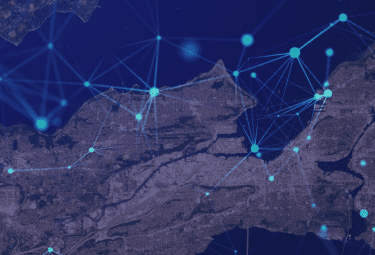Innovation to Impact. See you at the July ESIP Meeting.
The Socioeconomic Value of Earth Science data for Community Resilience
Can Earth Science data contribute socioeconomic value by enhancing place-based community resilience? To find out, we held a session entitled, “Community Resilience: Demonstrating the Socioeconomic Value of Earth Science data” on Jan 9th, 2018 at the ESIP winter meeting in Bethesda, MD.
The session built on previous work conducted at ESIP meetings on community resilience (summer 2015), the integration of socio-environmental datasets (winter 2017), and current work conducted by the co-organizers through their professional roles. For the first part of the session, we presented community resilience data challenges in specific U.S. cities, as well as proposed solutions. Then, we led facilitated discussions with approximately 15 participants to consider ESIP’s potential role in enhancing the value of earth science data, providing data services, and contributing to planning efforts to support place-based community resilience.Two questions were addressed in the discussions:
- What are potential linkages between data-driven community resilience and other ESIP work, as well as with the overall Earth Science data community?
- What are specific ways that ESIP can contribute to place-based community resilience?
Our findings indicate that ESIP could contribute to Data-Driven Community Resilience by:
- Helping communities access the right tools and information for place-based community resilience by:
- Identifying the right data and information products through better understanding community needs and wants in support of resilience
- Developing a community of practice that includes both data experts and community resilience practitioners, so that their transdisciplinary engagement can help to develop data solutions for community resilience
- Developing communication mechanisms between data experts and community resilience practitioners to develop successful data/information flows
- Supporting capacity-building and education among data experts and community resilience practitioners to help improve the quality of products and decision-making, respectively, that are made to support community resilience
- Documenting place-based community resilience use cases to help enable the development of useful data and information products, processes, and tools.
- Developing and sharing conceptual and technical tools that enable transdisciplinary collaboration and community resilience by:
- Using an existing place-based community resilience conceptual framework developed by resilience practitioners, and identifying the role of specific ESIP constituents in this framework
- Using a common set of indicators for place-based community resilience that have been developed for different sectors and scales of governance
- Understanding and communicating the role of semantic resources in identifying and defining concepts of resilience
How we plan to move forward (with you!):
- Partner with other ESIP clusters to host a data-specific community resilience session at an upcoming ESIP meeting, and/or documenting community resilience use cases by obtaining input from agencies or other stakeholders as to how data is being used.
- Create an actionable framework within ESIP that aims to connect place-based community end users (e.g., city planners) and data practitioners.
- Capture the process of our workflow on an open source site to serve as a template for broader place-based community resilience and data community collaborations.
In particular, our work may integrate well with on-going work conducted by the following ESIP clusters and committees:
- CLEAN Network cluster,
- ESIP Education committee,
- Data Stewardship committee,
- Agriculture and Climate cluster,
- Disaster Lifecycle cluster,
- Data to Decisions clusters, and
- Semantic Technologies committee.
If you or your ESIP Cluster is interested in working with us on this endeavor, please get in touch!
We welcome your thoughts on this on-going project. Please take a look at our detailed report at https://tinyurl.com/y6vl4oev, and add your comments and ideas by May 31, 2018. For further communication, please contact Arika Virapongse, av@middlepatheco.com.



